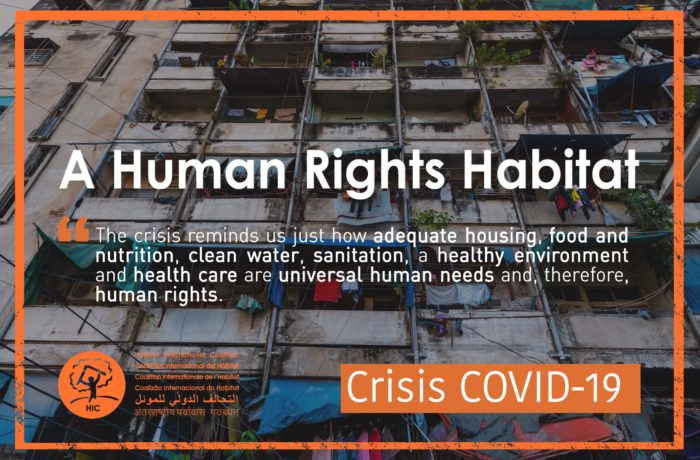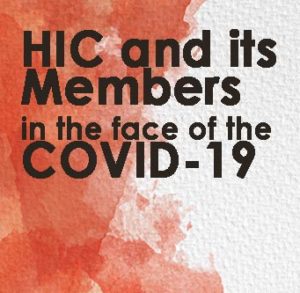(This text was originally published by HIC HLRN on March the 17th, 2020. The original text is available at HIC HLRN Website)
![]() Statement available here: We need a human rights habitat – Covid-19
Statement available here: We need a human rights habitat – Covid-19
In the current COVID-19 pandemic, the World Health Organization (WHO) has advised and responsible governments have enforced that we stay at home, frequently wash our hands often with soap and warm water, maintain social distancing and keep our immune system strong. These live-saving measures are impossible for vulnerable people living in informal communities, displacement and refugee camps and other confined and crowded living conditions. Those inhabitants typically that clean water/sanitation, cannot social distance, and do not have healthy food and nutrition to keep immune systems strong. The crisis reminds us just how adequate housing, food and nutrition, clean water, sanitation, a healthy environment and health care are universal human needs and, therefore, human rights.
We are freshly reminded also that people living in inadequate housing and habitat conditions are among the most vulnerable to disease vectors[1]. While we salute the heroic citizens who provide essential public services at this treacherous time of the COVID-19 pandemic, we call special attention to those homeless, under-housed, prisoners, refugees, displaced persons, asylum seekers and people under foreign occupation and war. It is our collective responsibility to protect and provide for these most vulnerable people and communities.
In the midst of the global COVID-19 crisis, it is unconscionable to subject people to forced evictions. The practice is a gross violation of human rights, especially the human right to adequate housing, and particularly egregious in times of pandemic. Therefore, we call on a total ban on forced evictions, home demolitions, involuntary relocations and dispossession by all spheres of government, sectors and actors, whether in urban or rural contexts.
We commend also the public figures and political leaders who have acted responsibly and called for a halt to these practices, in general, and especially during the present pandemic[2]. In addition, it is essential that public institutions coordinate with the private sector in common service to the public good, without discrimination, exception, profit motive or self-interest, to prioritize all those living in the open and on the street, in homeless shelters, informal settlements, prisons, refugee camps and locations of displaced persons and asylum seekers.
While the human right to decent work is related to all other human needs and human rights, those persons who are unable to work or have lost jobs and income due to COVID-19 become ever more vulnerable to the virus and its consequences.
All competent governments, enterprises and institutions must coordinate urgent measures to ensure the highest attainable standard of mental and physical health, including universal health care, for persons in their jurisdiction and/or territory of effective control. Priority must be given to persons working and living in informal and squalid conditions, persons with underlying health challenges, older persons, infants and pregnant women.
We note, however, that some government measures are notoriously inadequate and cruelly negligent[3]. This public failure is additional to acts and policies of governments that create squalid living conditions, overcrowding and the resort to informal and precarious habitats for people for whom they bear responsibility.
Policies, practices and budgets must ensure that the most-vulnerable persons and communities enjoy the following essential goods and services:
Information and Prevention
- Sufficient, understandable, accurate and timely information and guidelines on the status of COVID-19, the number of cases and their spread;
- Guaranteed sufficient food and nutrition and access to safe water;
- Testing kits and adequate facilities and personnel to detect COVID-19 free of charge;
- Mobile health services and teams to administer tests, check and treat symptoms, as well as treat common illnesses;
- Regular and sufficient supply of clean water for washing and bathing, as well as adequate sanitation;
- Adequate supply of effective cleaning and disinfectant products for domestic use;
- Sufficient cleaning and disinfecting facilities for clothing and bedding, especially in shared living spaces;
- Special attention to the elderly and nursing homes;
- Avoidance of repression and abuse by police and military forces.
Care and Cure
- Facilities and personnel suitable for treating COVID-19 free of charge;
- Easy access to adequately staffed and equipped primary health centers and facilities;
- Increased number of hospital beds, especially intensive care units (ICU);
- Protecting health personnel.
Exceptional measures
- Guarantee a minimum income for workers who depend on a daily income or who work in the informal sector;
- End job layoffs and ensure adequate unemployment insurance for those who have lost their jobs and have no income;
- A moratorium on the payment of rent, loans and mortgages for households in difficulty;
- Refunds for those who have paid for services in advance but are now denied (students, pensioners, the chronically ill, etc.);
- Conversion of unused and empty buildings and structures into housing for people in need;
- Putting all economic and human resources to work to defeat the pandemic;
- Promoting solidarity at all levels, especially international solidarity.
All persons in society also must cooperate to ensure mutual protection in this time of pandemic. That includes heeding the advice of medical and public health specialists advising against unnecessary circulation and gatherings.
While this global pandemic and these necessary measures to combat it require exceptional expenditures and resources, we urge governments to use their authority and standing obligations of state, including under Human Rights Treaties, to mobilize needed funds by prioritizing the diversion of bloated military budgets and subsidies to fossil fuel and other toxic industries, and impose sufficient taxation on those activities, enterprises, transactions and parties able to contribute to this common effort.
More than ever, we all need to avoid stigmatizing and discriminating against others through this common crisis.
All measures in response to the COVID-19 pandemic require that we avoid violating the human rights of others and create and maintain a human rights habitat for human well-being to prevail.
Habitat International Coalition
27 March 2020
See the actions of HIC Members and Allies at
https://www.hic-net.org/hic-calls-for-social-justice-in-the-face-of-the-covid-19-crisis/
[1] WHO Housing and health guidelines (Geneva: World Health Organization, 2018), at: http://apps.who.int/iris/bitstream/handle/10665/276001/9789241550376-eng.pdf?ua=1; Health principles of housing (Geneva: World Health Organization, 1989) at: http://www.hlrn.org/img/documents/WHO%20Health%20Principles%20of%20Housing_eng.pdf.
[2] Peter Gowan, “Coronavirus Calls for an Emergency Rent Freeze and Eviction Moratorium,” Jacobin (12 March 2020), at: https://www.jacobinmag.com/2020/03/coronavirus-housing-security-rent-freeze-eviction; Bryant Harris, “Intel: House Democrats ask whether Israel violating US aid restrictions,” al-monitor (16 March 2020), at: https://www.al-monitor.com/pulse/originals/2020/03/intel-house-democrats-israel-aid-fight-palestinian-west-bank.html#ixzz6Gyct7iWO; Heather Stewart, “Labour calls for ban on evictions of tenants affected by Covid-19,” The Guardian (16 March 2020), at: https://www.theguardian.com/world/2020/mar/16/labour-calls-for-ban-on-evictions-of-tenants-affected-by-covid-19?fbclid=IwAR1TnCMmfPuWlajriZbSJ9_Cj32dNlKLk3956qZYkCA0VR2VuFzBG-MLsTE.
[3] For example, Israel has made only 500 COVID-19 testing kits available to the besieged population of nearly 2 million in the Gaza Strip, 70% inhabited by refugees that Israel created in its ethnic cleansing of Palestine. “Gaza: uniquely shielded, yet ultra-vulnerable to corona,” France24 https://www.france24.com/en/20200320-gaza-uniquely-shielded-yet-ultra-vulnerable-to-corona. Indian-occupied Kashmir remains under communication black-out as COVID-19 has reached the capital city of Srinagar. Zulfikar Majid “Coronavirus: Kashmir reports first positive case,” Deccan Herald (18 March 2020), at: https://www.deccanherald.com/national/north-and-central/coronavirus-kashmir-reports-first-positive-case-815096.html.

